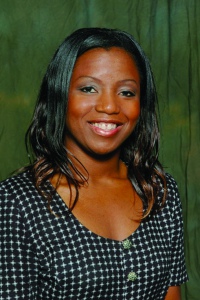About

The WW Dissertation Fellowship in Women’s Studies
Nwando Achebe
WS ’00
Seeing the Whole Dance: Nwando Achebe WS ’00 brings new perspective to African women’s power
“In order to appreciate the beauty of the masquerade dance,” say the Igbo people of Nigeria, “you can’t stand in one position.” Taking in the full beauty of masked, costumed spirit dancers requires more than one vantage point.
This adage strikes home for Nwando Achebe, WS ‘00—an Igbo woman, professor of history at Michigan State University, and feminist scholar who lives at the crossroads of two cultures. “There are so many aspects that make me who I am and therefore shape my understanding that there’s not one way to view the world,” she says.
 Professor Achebe’s 2011 biography, The Female King of Colonial Nigeria: Ahebi Ugbabe, not only reflects her unique worldview but also tells the story of another Igbo woman who made her place at a cultural crossroads.
Professor Achebe’s 2011 biography, The Female King of Colonial Nigeria: Ahebi Ugbabe, not only reflects her unique worldview but also tells the story of another Igbo woman who made her place at a cultural crossroads.
“Before I discovered Ahebi Ugbabe,” Professor Achebe says, “the canon out there was that there were no female warrant chiefs in all of colonial Africa—that there were only male warrant chiefs.” The institution of warrant chiefs, created by the British colonial government, supported attempts at indirect rule. In nations such as the Igbo that were not ruled by a kingship system, the British issued warrants of office to designate their local rulers, known as warrant chiefs.
“Ahebi Ugbabe was the only female warrant chief in all of colonial Nigeria and possibly all of British colonial Africa—but she also was a king,” Professor Achebe says. “She gets the warrant chief position from the British, but the kingship she derived from her relationship with the Igala, one of the most powerful kingdoms that was close to the Igbo nation where she came from.”
Professor Achebe’s inspiration to research and write on African women came from the negative descriptions of African women she encountered as a graduate student at the University of California at Los Angeles. She says she wondered why scholars claimed African women were “beasts of burden” just because they woke up in the morning, strapped their children on their back and went straight to the farm. Professor Achebe argues that this is not considered overworking in Africa, but rather, is an expected contribution to society.
In the face of what she considers a “Eurocentric misinterpretation of evidence” regarding the lives of African women, Professor Achebe wants scholars to reexamine the way they view this culture.
“I’m not saying, ‘Ban this [Western scholarship]. Let’s not read it,’” she elaborates. “No, read it, but let us not stand in one position to view this masquerade dance.”
The Women’s War of 1929, in which Igbo women joined forces to fight colonial domination, drew Western attention to gender dynamics in this traditional society. The now-classic 1958 novel, Things Fall Apart, by Professor Achebe’s father, Chinua Achebe, brought further academic and intellectual focus to the power of women in Igbo society and to the ways in which colonial intervention changed gender roles.
However, Professor Achebe’s new book uncovers the story of a woman who did not fight the British but befriended them and used the access they provided to her advantage. “She goes against everything that we’ve learned and accepted as being true about Igbo women,” Professor Achebe explains. “She was a brilliant woman who was able to see avenues of power in the British, to see avenues of power in the Igala. She was able to use her relationship with those two groups of people and rise to heights that were entirely unforeseen not only in colonial Nigeria but, I would argue, even today.”
Professor Achebe attributes the beginnings of her research to the support provided by her Woodrow Wilson Dissertation Fellowship in Women’s Studies. As an international student, she says, there was not much funding available to her until she discovered Woodrow Wilson.
Ten years later, Professor Achebe says she is still constantly reminded just how important her Fellowship is in terms of opening doors. “People don’t have to say it. When it’s on your CV it’s again an affirmation of your work,” Professor Achebe says. “To have been affirmed by this Foundation so early in my career is something I will be forever thankful for.”

